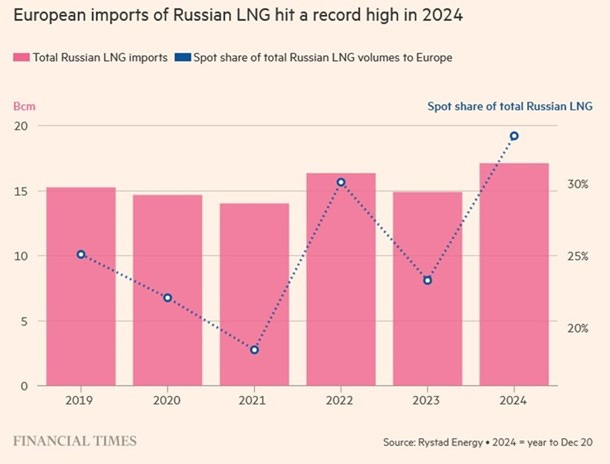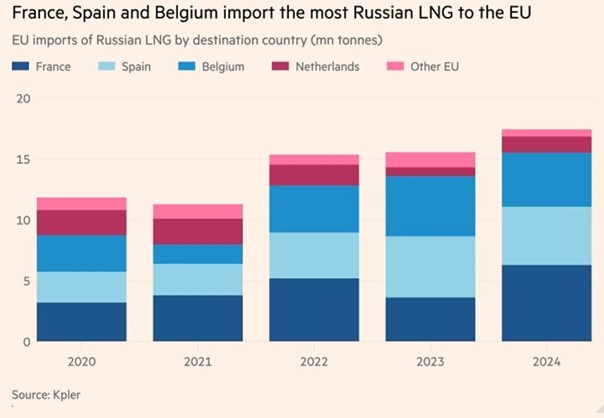Energy Musings - January 30, 2025
Europe continues to use Russian natural gas, especially LNG. Does the repair of Nord Stream 2 represent an attempt to be ready to use more Russian gas if peace arrives in Ukraine?
Merkel, Germany, And Russian Natural Gas
Denmark’s energy agency has granted Nord Stream 2 AG, a subsidiary of Russia’s Gazprom, permission to conduct preservation work on the Baltic Sea’s Nord Stream 2 (NS2) natural gas pipeline. A series of blasts in 2022 damaged one of the two pipes making up NS2, creating a geopolitical controversy. The cause of the blasts remains unknown. When the announcement was made, we were reading reviews of Angela Merkel’s recent autobiography, Freedom, which provided an interesting news juxtaposition.
The Danish agency says, "The work aims to preserve the damaged pipeline by installing customized plugs at each of the open pipe ends to prevent further gas blow-out and the introduction of oxygenated seawater." The announcement sparked speculation that the repairs would be a prelude to the pipeline returning to service and delivering Russian gas to Europe. What a policy reversal it would represent. However, it could be related to an anticipated peace in the Russia-Ukraine war. According to the Danish agency, the damaged NS2 pipeline is estimated to contain approximately 9-10 million cubic meters of natural gas, while the second pipeline remains filled with gas.
The news came as a report shows that significant Russian gas volumes are still being consumed in European economies. The use is despite Europe’s banning the use of Russian gas following its invasion of Ukraine in 2022.
The Financial Times reports that Europe imported record volumes of Russian liquefied natural gas (LNG) last year despite the West’s sanctions against the Russian energy industry. In reality, the sanctions were only levied against Russia’s crude oil, coal, piped natural gas, its companies, executives, ships, and energy traders. The European Union reported that only 10% of the natural gas imported in 2024 came from Russia.
Russian LNG is OK in the EU, but no one will acknowledge it.
Germany does not receive Russian LNG cargoes because it has banned any supplies being imported through any of its ports. However, since the European Union has not banned Russian LNG, it is imported through French and other European ports and blended into gas volumes flowing to Germany.
Belgium, France, and Spain’s energy ministers have insisted that very little of the LNG arriving from Russia is used domestically. Most of it is piped to other European Union member countries, including Germany.
Angelos Koutsis, energy policy officer at Belgian think-tank Bond Beter Leefmilieu, which helped produce the report the Financial Times relied upon for its article, said, “Germany has prohibited the import of Russian LNG at its ports. But imports officially sourced from France and Belgium are in fact partly composed of Russian LNG, effectively whitewashing the gas.” She stated, “The end result is that all countries involved can claim not to be responsible for the still increasing demand for Russian LNG.” No finger-pointing is allowed in the European Union.
Russian gas arrives in one country but passes through to others.
The pipelining of Russian natural gas is a story in its own right. Nord Stream 1 (NS1) was commissioned in 2011. It and its sister NS2 each consist of two pipelines, A and B, transporting gas from Russia to Germany under the Baltic Sea. Each pipeline is 48 inches in diameter and 750 miles long. Each line has a capacity of 27.5 billion cubic meters a day.
The $11 billion NS2 pipeline was completed in 2021 to boost the volume of Russian natural gas flowing to Germany. The NS1 and NS2 pipelines were an insurance policy for Germany, if Russian piped gas was disrupted by disagreements with the European countries that the land pipelines traversed.
German Chancellor Angela Merkel backed the pipeline projects. Her rationale reportedly is covered in the autobiography, according to book reviews. But they also suggest we should not waste our time reading it. (Another post will discuss Merkel’s book, energy policy, and Germany’s economy.)
Germany stopped the NS2 pipeline from going into operation as European relations with Moscow broke down ahead of Russia's invasion. The pipeline was also the target of U.S. economic sanctions.
In September 2022, one of the two NS2 pipelines, along with both lines of NS1, was damaged by mysterious blasts. No one has taken responsibility for causing the damage, and many theories about the destruction exist. Both the U.S. and Ukraine have denied involvement in the destruction, as has Russia. The destruction mystery will spawn spy mystery books for years, some of which may be worth reading. Of course, knowing the real story may be even more interesting to read.





